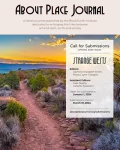
Strange Wests
Call for Submissions
Editors: Jasmine Elizabeth Smith and Matty Layne Glasgow
Assistant Editors: Jake Skeets and Ashanti Anderson
Open for submissions on January 1, 2024*
All submissions are due by March 10, 2024
*Note the opening date: Jan. 1, 2024
Strange Wests
West has always been more than mere direction, a setting sun, evening. In lands now known by many as the United States of America, West invokes a fraught mythology of wilderness and conquest, of destiny and riches, of jackrabbit homesteads and romantic distances, of cowboys and bears. For so long these symbols have dominated our histories of these lands, centering whiteness and masculinity in a rugged, difficult terrain. But the West and its frontier have always been strange, full of contradictions, queer even. As Josh Garrett-Davis, a curator, scholar at the Gene Autry Museum of the American West, posits of the regional West, “[It is] a borderland—or two-or-more-sided frontier—where old and new coexist, collaborate, fight, innovate, [holding] ample grounds for new stories.”
The West as we understand it has never been uninhabited. People have thrived in communion with these lands for thousands of years. Flora and fauna, too. Where some see vacant desert, or land to be occupied for the next housing development, we cast our eyes upon resilient life, those who understand the importance of water and resource conservation. In South Dakota, Indigenous water advocates protest pipeline routes, while Chicano artists muralize the scar of a border wall with the painting of roses.
We call contributors to conceive of the West beyond its conventional and colonialized framework. What happens when the dam breaks, when waters flow along their pre-colonial course and stewardship is returned to the original caretakers of the land? There are many ways to deconstruct a dam, an archetype, to unearth histories long-buried in sand or alpine forest. The West is multiple and many.
In the next issue of About Place Journal, we invite you to consider and reimagine all things West. Send us your visual poems and performances, your experimental stories and essays, your art classified by no other name than art. As we decenter traditional subjects and propagandized histories of this ambiguous region, share with us your witness and protests, your lineages who have lived here longer than the word itself and this country. We are particularly interested in work from young, emerging artists (17 and younger), as well as work by BIPOC and LGBTQIA+ artists, especially those whose stories have been excluded by a mythology of the west centered on whiteness, masculinity, and extraction.
No comments:
Post a Comment